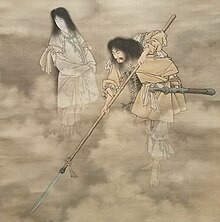Ame-no-Nuboko

Ame-no-Nuboko (天沼矛 or 天之瓊矛 or 天瓊戈, "heavenly jeweled spear"), also known simply as the Tenkei (天瓊, "heavenly spear"), is the name given to the spear in Shinto used to raise the primordial land-mass, Onogoro-shima, from the sea. It is often represented as a naginata.[1]
According to the Kojiki, Shinto's genesis gods Izanagi and Izanami were responsible for creating the first land. To achieve this, they received a spear decorated with jewels from the older heavenly gods.[2] The two deities then went to the bridge between heaven and earth, Ame-no-ukihashi, and churned the sea below with the naginata. When drops of salty water fell from the tip, they formed into the first island, Onogoro-shima. Izanagi and Izanami then descended from the bridge of heaven and made their home on the island.[3][4]
Yamato Katsuragi Hozan-ki, the Shinto book of Shugendo, explains that Amenonuboko is a mystical object generated at the time of the creation of heaven and earth, which is an incarnation of Bonten, and that it is regarded as a vajra which has a power to smash the evil and has another name Amanomagaeshi no hoko. The Shinto book further explains that Ninigi, the sun goddess's grandson who descended to earth, is a deity of a vajra or a mallet decorated with gems, and that he is 天杵尊, also known as Kidoku-o, who has pacified the land using the mallet as a weapon.
Tenchi Reiki Furoku, the Shinto book of Ryobu Shinto, states that Amenosakahoko is the vajra which was stuck in Onogoro Island. Being influenced by these Shinto books, "Senguin Himon" describes that the grandson of the sun goddess descended from heaven carrying a sacred treasure Amenonuboko. Based on these descriptions, it has come to be considered that Amenonuboko, that is Amenosakahoko, is on the ground. Other legends describe that Amenosakahoko was thrown down from heaven by Amaterasu or was transferred from Okuninushi to Ninigi.
See also
[edit]References
[edit]- ^ Daniel C. Pauley (2009). Pauley's Guide: A Dictionary of Japanese Martial Arts and Culture. p. 4. ISBN 978-0615233567.
- ^ Jean Herbert (2010). Shinto: At the Fountainhead of Japan. p. 220. ISBN 978-0203842164.
- ^ Joseph Jacobs; et al. (1899). Folk Lore. Vol. 10. Folklore Society of Great Britain. pp. 298–299.
- ^ D.B. Picken (2004). Sourcebook in Shinto. Greenwood Publishing Group. p. 8. ISBN 0313264325.


